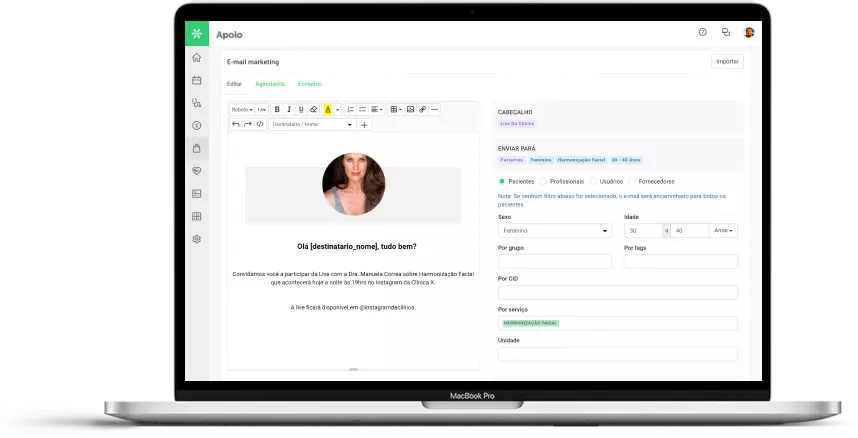
Medical reports are essential documents in healthcare in the United States. They are detailed reports prepared by doctors and healthcare professionals, recording conclusions and diagnoses related to a patient's health status. These conclusions are based on a variety of information sources, including clinical exams, laboratory tests, medical history, and physical evaluations.
Before we continue, we would like to ask: Have you heard about Ninsaúde Clinic? Ninsaúde Clinic is a medical software with a comprehensive and efficient scheduling system, electronic health records, customized reports for each specialty, telemedicine capabilities, financial control, insurance billing, and more. Schedule a demo or try Ninsaúde Clinic now!
The significance of medical reports in clinical practice is undeniable. They serve as a crucial tool for informed medical decision-making. Medical reports not only assist doctors in identifying diseases, medical conditions, and injuries, but they also guide the development of personalized treatment plans. Additionally, they play a vital role in monitoring and tracking the patient's progress over time.
The importance of medical reports goes beyond the doctor's office. These documents are frequently requested by healthcare institutions to provide a solid basis for decisions related to hospitalization, surgeries, and treatments. Furthermore, they are used by companies and insurance providers to assess health insurance eligibility and medical leave. Therefore, understanding the accuracy and integrity of medical reports is crucial for those seeking effective medical care and well-informed health-related decisions.

Types of Medical Reports
- Imaging Reports (Radiology, Ultrasound, MRI, etc.): These reports provide detailed visual information about the inside of the body through medical images. They are crucial for diagnosing diseases, injuries, and anomalies.
- Pathology Reports: Prepared by pathologists, these reports analyze tissue samples, such as biopsies, to diagnose conditions like cancer and other diseases based on microscopic analysis.
- Laboratory Reports (Blood Tests, Urinalysis, etc.): These result from the analysis of bodily fluids, providing information about the patient's overall health, including blood counts, chemical levels, and disease markers.
- Electrophysiological Reports (ECG, EEG, etc.): They record the electrical activity of the heart (ECG) and the brain (EEG), aiding in the diagnosis of cardiac and neurological issues, respectively.
Each of these types of reports plays a specific role in assessing a patient's health and is crucial for the diagnosis, treatment, and monitoring of medical conditions. Therefore, understanding these categories is essential to ensure comprehensive and effective healthcare.

Software in Medical Report Generation
In recent years, software has played a fundamental role in revolutionizing the creation of medical reports and simplifying and enhancing the clinical documentation process. The introduction of technology in this context has allowed doctors and healthcare professionals to generate reports more efficiently and accurately. One of the main advantages of using software in this context is the ability to customize. Report generation software enables professionals to adapt report templates and formats to the specific needs of their practices, making them more relevant and tailored to patient diagnosis and treatment.
In this scenario, Ninsaúde Clinic software stands out as a comprehensive solution offering a wide range of features, including the creation of personalized medical reports. With this tool, healthcare professionals can streamline the documentation process, save time, and reduce transcription errors. Furthermore, customizing reports is made easy, allowing each professional to tailor the content to their preferences and specific needs.
The use of software in medical report generation not only optimizes the routines of doctors but also contributes to improving the quality of clinical records, resulting in more precise and effective patient care. The customization offered by solutions like Ninsaúde Clinic software represents a significant advancement in healthcare, making professionals' lives easier and enhancing the patient experience.

Applications of Medical Reports
Medical reports play a multifaceted and vital role in various aspects of healthcare. Firstly, they are essential for diagnosing diseases. Reports provide an objective and detailed assessment of the patient's health status, providing critical information that guides the identification of medical conditions, from infectious diseases to cancer and chronic disorders. This diagnostic function is fundamental to ensuring appropriate treatment and early therapeutic interventions.
Moreover, the importance of medical reports in medical research cannot be underestimated. Data compiled from reports of various patients can be used for clinical, epidemiological, and research studies, allowing scientists to analyze trends, identify risk factors, and develop new therapeutic approaches. Reports become a valuable source of information in advancing the field of medicine.
Finally, medical reports also play a fundamental role in monitoring treatments. They provide a documented record of the patient's health status over time, allowing doctors and patients to assess the effectiveness of therapeutic interventions. This is particularly relevant in chronic conditions where continuous monitoring is essential.
Challenges and Ethical Considerations
The increasing adoption of technology in medical report generation brings a range of challenges and important ethical considerations. Firstly, the importance of data privacy and security is paramount. With the digitalization of health records and automated report generation, ensuring the protection of patients' data has become a critical concern. Healthcare systems and medical institutions must implement rigorous security measures to safeguard this sensitive information, maintaining the confidentiality and integrity of medical data.
Additionally, ethical considerations in automated report generation are also crucial. Process automation can increase efficiency and accuracy in report production, but it is essential for healthcare professionals to actively engage in the process. Automated reports should be supervised by doctors to ensure that interpretations are contextual and suitable for each clinical situation. Responsible use of automated technologies ensures that clinical judgment and medical empathy continue to play a central role in patient care.
In summary, technology-assisted medical report generation faces challenges related to data privacy and security, as well as crucial ethical considerations to maintain the integrity and quality of medical care. By addressing these challenges carefully and responsibly, it is possible to reap the benefits of automation without compromising ethics and safety in healthcare.

Future Perspectives
As medical technology continues to evolve, prospects for medical reports promise significant advances in clinical practice. One of the most notable trends is the ongoing development of specialized software for medical reports. These tools are becoming more sophisticated, allowing healthcare professionals to generate reports more efficiently and accurately. The customization and adaptability of these software solutions are becoming standard, catering to each doctor's and specialty's specific needs.
Furthermore, the integration of artificial intelligence (AI) and machine learning is revolutionizing how medical reports are generated. A notable example is the Ninsaúde Clinic system, which uses AI to assist doctors in the diagnostic process. During a consultation, AI can analyze symptoms and information provided by the doctor and offer diagnostic suggestions based on a vast database of medical conditions. This collaboration between doctors and AI promises to improve diagnostic accuracy and save time, enhancing patient care quality.
As AI and machine learning technology advances, we can expect medical reports to become more accurate, efficient, and accessible. These innovations will not only benefit healthcare professionals but also improve the patient experience, ensuring faster diagnoses and more effective treatments. The future of medical reports is promising, with technology playing an increasingly central role in medical practice.

Conclusion
Understanding the various types of medical reports and the incorporation of specialized software in healthcare is crucial for modern clinical practice in the United States. Whether they are imaging reports, pathology reports, laboratory reports, or electrophysiological reports, medical reports play a fundamental role in identifying diseases and monitoring patient health.
As a result, the ability to customize reports through software, including the integration of artificial intelligence, is revolutionizing the accuracy and efficiency of medical diagnosis. Thus, knowledge and responsible adoption of these tools are imperative to improve the quality of medical care and, consequently, patients' lives.
The future of medicine will undoubtedly be influenced by this combination of clinical expertise and technological advancements, promoting more effective and personalized healthcare.
And there you have it, did you find these insights helpful? Keep following the blog to stay informed about more content like this. Are you a healthcare professional who hasn't yet adopted management software? Get to know the Ninsaúde Clinic system.

